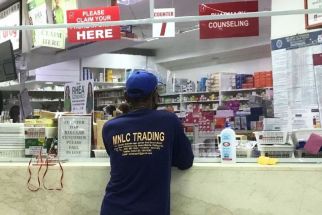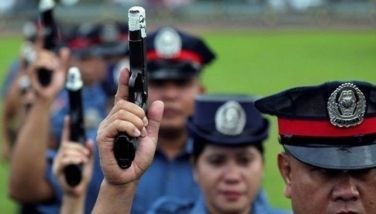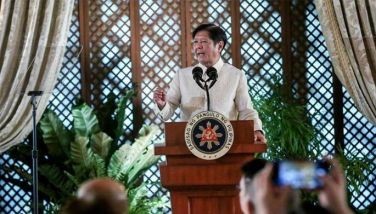PCGG eyes criminal raps vs Cojuangco
July 14, 2003 | 12:00am
The Presidential Commission on Good Government (PCGG) will review all cases related to the coconut levy to determine if the government can file criminal charges against businessman and presidential aspirant Eduardo Cojuangco and other cronies of the late dictator Ferdinand Marcos.
The case review came as a consequence of the Sandiganbayan’s ruling that the coconut levy fund used by Cojuangco to set up the United Coconut Planters Bank (UCPB) were public funds, ending a 16-year ownership battle between Cojuangco and the government.
Former solicitor general Francisco Chavez called on the government to file criminal raps against Cojuangco and Zamboanga City Mayor Maria Clara Lobregat for the illegal use of the coconut levy fund.
"We will be reviewing all the pending (coconut levy) cases to see what actions we can take as a consequence of the Sandiganbayan decision," PCGG Commissioner William Dichoso said in a telephone interview.
The Sandiganbayan declared that Cojuangco’s 95,304 shares in UCPB came from the government’s 72.2 percent stake in the bank. These shares, the anti-graft court said, were "conclusively owned by the Republic of the Philippines."
The Sandiganbayan based its ruling on the Dec. 14, 2001 decision of the Supreme Court that the coconut levy funds were "prima facie public funds."
Chavez has recommended that plunder charges be filed against Cojuangco and Lobregat for their illegal use of the coconut levy funds.
The funds were taken from levies imposed on small coconut farmers during the Marcos regime.
Besides UCPB, the other companies created using the coconut levy funds include the Philippine Coconut Producers Federation Inc. (Cocofed), Cocofed Marketing Corp., Cocofed Life Insurance Corp., and the United Coconut Oil Mills.
Dichoso added that Ombudsman Simeon Marcelo might also be working for the filing of criminal cases against Cojuangco, but the PCGG would still do its part in the government’s efforts to recover the ill-gotten wealth of the Marcoses and their cronies.
"Ombudsman Marcelo is closely working on the (coconut levy) cases but, based on the results of our review, we’ll make a recommendation to the Ombudsman on the next steps that we can take. We already won the civil aspect of the case, so we’ll (explore) the criminal side," he said.
Under this setup, all the criminal cases of the PCGG are being handled by the Office of the Ombudsman, while the civil cases are being pursued by the Office of the Solicitor General.
Dichoso did not say why the Office of the Ombudsman failed to file criminal charges against Cojuangco in the past.
However, during the time of former Ombudsman Aniano Desierto, the PCGG complained Desierto was allegedly not pursuing with vigor the cases against the Marcos family and their cronies.
Dichoso also said that although the PCGG still has to wait a month — during which Cojuangco may file an appeal — before the Sandiganbayan decision becomes final and executory, he also feels the PCGG has good chances of ultimately winning the case.
If Cojuangco decides to appeal the case, he would have to elevate it to the Supreme Court, which already ruled in the PCGG’s favor in one aspect of the coconut levy case.
Dichoso added that such a situation will work to the PCGG’s advantage and will benefit small coconut farmers.
PCGG commissioner Ruben Carranza said that while the PCGG has not "won the war," it has "won a crucial battle."
Officials said the ruling could have potential impact on Cojuangco’s management control over San Miguel Corp. (SMC), the country’s top brewer and one of its largest companies.
UCPB administers a 27 percent voting bloc in SMC, while Cojuangco, the beer giant’s chairman and chief executive, controls another 20 percent.
Marcelo said the ruling "would set a precedent" over the other cases involving the coconut levy funds, including the SMC dispute.
Presidential Spokesman Ignacio Bunye denied claims by the opposition that the fund-transfer decision was politically motivated to spoil Cojuangco’s plans of launching a bid for the presidency next year.
"This decision has been pending for the last 17 years," Bunye told RMN radio. "During these years, the (respondents) had the opportunity to explain their sides. This accusation is very far-fetched."
He said the President will return the money to the impoverished coconut farmers from whom it was taken and that government has already come up with an initial list of "identified beneficiaries" who will benefit from the ruling. — With AFP
The case review came as a consequence of the Sandiganbayan’s ruling that the coconut levy fund used by Cojuangco to set up the United Coconut Planters Bank (UCPB) were public funds, ending a 16-year ownership battle between Cojuangco and the government.
Former solicitor general Francisco Chavez called on the government to file criminal raps against Cojuangco and Zamboanga City Mayor Maria Clara Lobregat for the illegal use of the coconut levy fund.
"We will be reviewing all the pending (coconut levy) cases to see what actions we can take as a consequence of the Sandiganbayan decision," PCGG Commissioner William Dichoso said in a telephone interview.
The Sandiganbayan declared that Cojuangco’s 95,304 shares in UCPB came from the government’s 72.2 percent stake in the bank. These shares, the anti-graft court said, were "conclusively owned by the Republic of the Philippines."
The Sandiganbayan based its ruling on the Dec. 14, 2001 decision of the Supreme Court that the coconut levy funds were "prima facie public funds."
Chavez has recommended that plunder charges be filed against Cojuangco and Lobregat for their illegal use of the coconut levy funds.
The funds were taken from levies imposed on small coconut farmers during the Marcos regime.
Besides UCPB, the other companies created using the coconut levy funds include the Philippine Coconut Producers Federation Inc. (Cocofed), Cocofed Marketing Corp., Cocofed Life Insurance Corp., and the United Coconut Oil Mills.
Dichoso added that Ombudsman Simeon Marcelo might also be working for the filing of criminal cases against Cojuangco, but the PCGG would still do its part in the government’s efforts to recover the ill-gotten wealth of the Marcoses and their cronies.
"Ombudsman Marcelo is closely working on the (coconut levy) cases but, based on the results of our review, we’ll make a recommendation to the Ombudsman on the next steps that we can take. We already won the civil aspect of the case, so we’ll (explore) the criminal side," he said.
Under this setup, all the criminal cases of the PCGG are being handled by the Office of the Ombudsman, while the civil cases are being pursued by the Office of the Solicitor General.
Dichoso did not say why the Office of the Ombudsman failed to file criminal charges against Cojuangco in the past.
However, during the time of former Ombudsman Aniano Desierto, the PCGG complained Desierto was allegedly not pursuing with vigor the cases against the Marcos family and their cronies.
Dichoso also said that although the PCGG still has to wait a month — during which Cojuangco may file an appeal — before the Sandiganbayan decision becomes final and executory, he also feels the PCGG has good chances of ultimately winning the case.
If Cojuangco decides to appeal the case, he would have to elevate it to the Supreme Court, which already ruled in the PCGG’s favor in one aspect of the coconut levy case.
Dichoso added that such a situation will work to the PCGG’s advantage and will benefit small coconut farmers.
PCGG commissioner Ruben Carranza said that while the PCGG has not "won the war," it has "won a crucial battle."
Officials said the ruling could have potential impact on Cojuangco’s management control over San Miguel Corp. (SMC), the country’s top brewer and one of its largest companies.
UCPB administers a 27 percent voting bloc in SMC, while Cojuangco, the beer giant’s chairman and chief executive, controls another 20 percent.
Marcelo said the ruling "would set a precedent" over the other cases involving the coconut levy funds, including the SMC dispute.
Presidential Spokesman Ignacio Bunye denied claims by the opposition that the fund-transfer decision was politically motivated to spoil Cojuangco’s plans of launching a bid for the presidency next year.
"This decision has been pending for the last 17 years," Bunye told RMN radio. "During these years, the (respondents) had the opportunity to explain their sides. This accusation is very far-fetched."
He said the President will return the money to the impoverished coconut farmers from whom it was taken and that government has already come up with an initial list of "identified beneficiaries" who will benefit from the ruling. — With AFP
BrandSpace Articles
<
>
- Latest
- Trending
Trending
Latest
Trending
Latest
Recommended





























